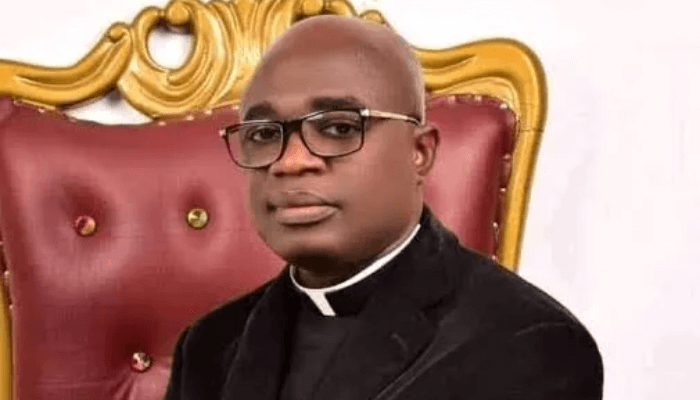YAOUNDÉ, Cameroon – Catholic bishops in Nigeria have issued a warning to priests and religious figures who engage in partisan politics or assume public office, threatening them with canonical sanctions.
This stance was made clear in an October 1 release co-signed by Archbishop Lucius Iwejuru Ugorji, President of the Nigeria Bishops Conference, and Bishop Donatus Aihmiosion Ogun, Secretary General of the Conference.
“Over the years, some priests in Nigeria, without the requisite authorization from the competent ecclesiastical authority, have actively ventured into partisan politics or the exercise of public office,” the statement notes.
“This situation has not only contravened the universal laws of the Church but has also scandalized a vast majority of Christ’s followers in the country,” the bishops say.
Expressing “deep pastoral concern” over the situation, the bishops sought guidance from the Dicastery for Evangelization and the Dicastery for Legislative Texts. With this guidance, the bishops have now outlined progressive measures to address these transgressions, in accordance with canon law.
In their October 1 statement, the bishops explain that any priest who violates the law by engaging in partisan politics, despite appeals and two canonical warnings from his bishop, “must be suspended from every exercise of the power of orders and of governance for an appropriate period, and could also be punished with canonical sanctions, such as having to reside in a particular place or territory.”
The statement further explains that if the priest continues to disobey, “he incurs the delict of disobedience to ecclesiastical authority,” and the sanction could be dismissal from the clerical state, as authorized by the Holy Father.
“We reaffirm the Church’s unequivocal prohibition of clerics against actively engaging in partisan politics, or assuming public office, without proper ecclesial authorization. This is a matter of utmost gravity, and we urge all priests to adhere faithfully to these canonical laws and embrace their sacred duties with the utmost fidelity and devotion,” the statement emphasizes.
The statement has sparked diverse reactions from followers on the official Facebook page of the Catholic Broadcast Commission of Nigeria, where it was published.
Chibuike Odimegwu criticized the bishops for focusing on what he considered trivial issues compared to the “hunger and suffering” affecting Nigerians today.
Engr Chimdimma Francisca Ikechukwu emphasized the need to address bad governance, suggesting that if it were tackled, “nobody will be interested in politics.”
On the other hand, Hon Jacob Joseph argued that priests should indeed participate in politics, citing the example of Benue State, where Catholic priest Hyacinth Alia serves as governor. He praised Alia, stating that he “is giving us a taste of good leadership.”
Emeka Umeagbalasi, a leading Catholic researcher and Director of the Catholic-inspired NGO, the International Society for Civil Liberties and the Rule of Law (Intersociety), offered a more nuanced perspective.
Umeagbalasi said the current political climate in Nigeria is not yet suitable for Catholic priests to be actively involved in politics.
“The political environment in Nigeria has not matured and is not spiritually or morally right for priests to be actively involved,” he told Crux.
However, he noted that in times of revolution, Catholic priests and bishops could justifiably engage in politics.
“In a situation where people clamor for change, and this clamor leads to a legitimate revolution aimed at improving society and transforming its sociological system, Catholic bishops and priests can fully or partially lead such revolutions. If, in the end, other revolutionary leaders decide to present these Catholic priests or bishops to lead the post-revolution governance, then so be it,” he told Crux.
Umeagbalasi said that when priests and bishops get involved in politics, it should be “a politics of selflessness, a politics that requires exemplary leadership.”
“It should be a politics that requires putting smiles on the faces of the downtrodden. It should be a politics that requires making society governable, providing democratic dividends, ensuring a steady supply of social amenities, fixing key infrastructure, curbing corruption and corrupt practices, and providing good governance by adhering strictly to the principles of the social contract. Anything short of that is not good,” he said.
He noted that this positive outlook contrasts sharply with the actions of some Catholic priests who have entered partisan politics in Nigeria.
Referring to the current governor of Benue State, Hyacinth Alia, who suspended his priestly duties to join politics and was elected governor on March 18, 2023, on the ticket of the ruling All Progressives Congress, Emeka described the party as “a party of rogues” and argued that Alia could not have become a candidate for governorship without engaging in unethical political practices.
“I’m aware that there is no way you could have emerged as a governorship candidate of the party without playing dirty games, without playing dirty politics,” Emeka told Crux.















